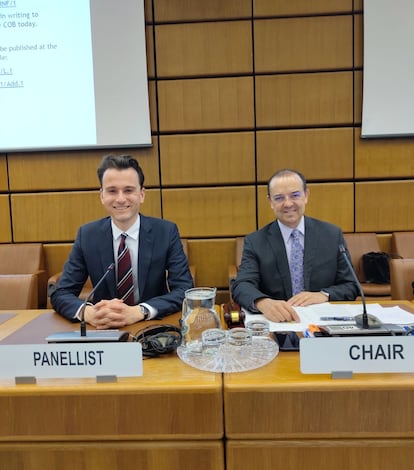León Castellanos-Jankiewicz: ‘The responsibility of gunmakers doesn’t end at the factory gate’
The expert explains that the lawsuit filed by Mexico against US weapons manufacturers is unprecedented and could become a model for other countries to also demand accountability

León Castellanos-Jankiewicz, 40, has eyes that are trained to read between the lines. From the University of Amsterdam and The Hague, where he directs a legal clinic on arms trade and works at the Asser Institute for International and European Law researching the human consequences of illicit arms trafficking, he observes with surgical precision a reality that is devastating his home country: 135,000 weapons cross the border from the United States into Mexico each year, most of them from small or medium-sized manufacturers. “The United States Supreme Court has given us a new path,” he says, following a recent adverse decision by that court.
A native of Yucatán with a PhD in international law, Castellanos-Jankiewicz is part of a legal front that doesn’t fire bullets, but rather strategies. Last week, the Mexican government once again intensified its legal offensive against U.S. arms manufacturers. The first legal action was filed in August 2021 before a district judge in Boston, Massachusetts, against several companies — including Smith & Wesson and Glock — for negligent business practices that, according to Mexico, facilitate illegal cross-border trafficking. In October 2022, the lawsuit was dismissed, but the Mexican government appealed.
On June 5, the U.S. Supreme Court ruled in favor of the defendants, but the Mexican expert doesn’t view this as a defeat: “The litigation is long, but the message is clear.” He speaks of deterrence, legal pressure, and the potential effects of the high court’s ruling. The potential civil liability of the gunmakers for illicit trafficking to Mexico was something the U.S. court had never previously considered.
In an interview with EL PAÍS, Castellanos-Jankiewicz speaks with conviction because Mexico is not alone. In the Bahamas, the Dominican Republic and Haiti, between 80% and 99% of illegal weapons come from the United States. It was also revealed this Monday that the assassination attempt against the Colombian presidential candidate Miguel Uribe was carried out with a Glock pistol, first purchased in August 2020 in Arizona. “Given this regional scenario, Mexico can be the spearhead to change this reality,” he asserts. “But the pressure cannot stop. We must continue.”
Question. How do you interpret the Supreme Court’s ruling?
Answer. In a way, it was predictable. However, I interpret it as a missed opportunity for American society to look inward and recognize that it faces a serious problem. This could have been an opportunity for self-reflection, to recognize the transnational dimension of arms trafficking, and at least question a deeply flawed business model.
Q. Were you surprised that the decision was unanimous, even with the support of judges considered progressive?
A. Since the conservative faction of the Supreme Court obtained a supermajority in October 2020, there has been a historic upswing in unanimous decisions from that court. That already says a lot about the internal politics of the Supreme Court and its now very tense relationship with the administration of President Donald Trump. It seems to me that the Court is under intense pressure to show unity on certain issues, and this was one of them.
Q. What do you think was the key legal argument that closed the door on the lawsuit?
A. The Supreme Court’s key argument was that Mexico failed to demonstrate that the defendant companies “aided” or “facilitated” illicit arms trafficking. In legal terms, this is the concept of aiding and abetting, which translates as assisting or instigating the commission of a crime. It falls short of complicity, which is a more serious degree, but it does involve some form of active or indirect participation. The Court analyzed whether the gunmakers were, in some way, collaborating or encouraging traffickers to transport weapons from the United States to Mexico. And it concluded that they were not. That was the argument with which Mexico lost the case.
Q. Mexico, however, had two main arguments. What happened to the second one?
A. The first is indirect participation or facilitation of the crime, which was rejected. The second, which the Court did not even address, has to do with the causal link between the companies’ actions and the harm caused in Mexico: the deaths, the violence, the presence of weapons in the hands of organized crime.
Mexico argued that if one reconstructs the journey of a gun step by step — from the crime scene in Mexico to its manufacture in the United States — there is a direct connection between the business decisions of these companies (in production, distribution, and marketing) and the violence occurring in Mexico. The companies, for their part, responded that this chain of events is interrupted by the actions of traffickers. That is, when a third party illegally purchases a gun and brings it into Mexico, that act constitutes an independent crime that breaks the companies’ legal liability.
Q. Although the ruling halts legal progress in this case, do you think it opens up new political or diplomatic possibilities between Mexico and the United States?
A. Of course. I think this lawsuit, although legally unsuccessful, has had a significant political impact: it managed to place the issue of arms trafficking at the center of the bilateral agenda between Mexico and the United States. Furthermore, it has allowed the Mexican government to hold a frank discussion about U.S. responsibility without having to directly confront its officials. Instead, it focused on the companies — and not just any companies, but the six manufacturers whose weapons represent nearly 90% of those recovered in Mexico.
Q. Several experts have pointed out that, despite the legal defeat, this case has a high symbolic value. What does that mean?
A. To begin with, it has allowed Mexicans to better understand what is happening in our country and, above all, why it is happening. I think there is a before and after the lawsuit in terms of the discourse on violence in Mexico. Before, we tended to assume that the responsibility was entirely ours, that the problem had deeply internal roots. But this lawsuit has made visible that it is also a transnational phenomenon, where many of the factors that fuel violence — such as the flow of weapons — come from abroad.

Q. What are the implications of this ruling for victims of gun violence?
A. One of the main goals of this type of legal action is precisely to seek financial compensation for the damages suffered. This avenue can represent a real opportunity for victims, especially in contexts where they cannot find justice through traditional channels. There are very few lawsuits against arms manufacturing companies globally, and Mexico’s strategy is a turning point.
Q. Do you think this type of pressure — legal, political, or through the media — could lead the arms industry to voluntarily change its practices?
A. Yes. No company with limited resources wants to be mired in litigation in federal court for three, five, or six years. If they don’t do it out of ethical responsibility or due diligence, they will do it to protect their financial interests. And, in one way or another, that is precisely one of Mexico’s objectives: for companies to self-regulate.
Q. What message does this legal experience leave for the rest of the world regarding the accountability of powerful industries?
A. The message is clear: no one is above the law. In a world so interconnected, where trade transcends borders, a company’s responsibility doesn’t end at the factory gate.
Sign up for our weekly newsletter to get more English-language news coverage from EL PAÍS USA Edition
Tu suscripción se está usando en otro dispositivo
¿Quieres añadir otro usuario a tu suscripción?
Si continúas leyendo en este dispositivo, no se podrá leer en el otro.
FlechaTu suscripción se está usando en otro dispositivo y solo puedes acceder a EL PAÍS desde un dispositivo a la vez.
Si quieres compartir tu cuenta, cambia tu suscripción a la modalidad Premium, así podrás añadir otro usuario. Cada uno accederá con su propia cuenta de email, lo que os permitirá personalizar vuestra experiencia en EL PAÍS.
¿Tienes una suscripción de empresa? Accede aquí para contratar más cuentas.
En el caso de no saber quién está usando tu cuenta, te recomendamos cambiar tu contraseña aquí.
Si decides continuar compartiendo tu cuenta, este mensaje se mostrará en tu dispositivo y en el de la otra persona que está usando tu cuenta de forma indefinida, afectando a tu experiencia de lectura. Puedes consultar aquí los términos y condiciones de la suscripción digital.









































